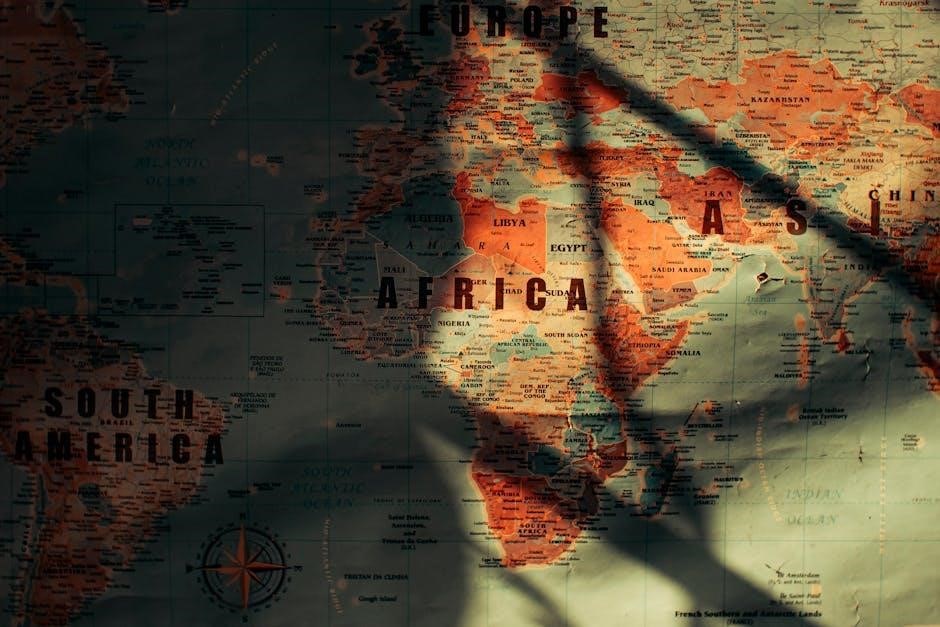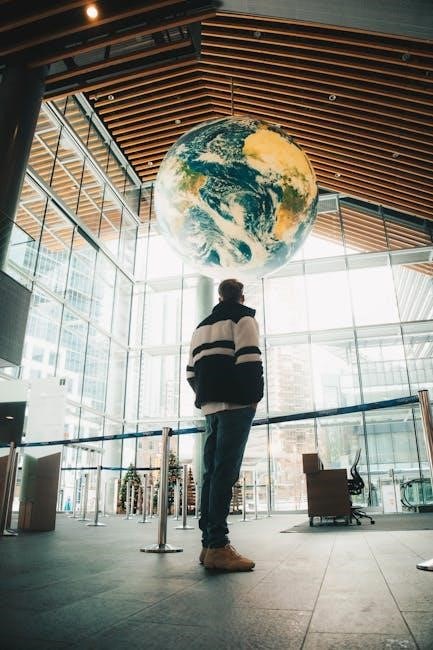origins of the modern world pdf
Understanding the origins of the modern world requires a global perspective, exploring interconnectedness and environmental changes from the fifteenth century onward, as highlighted in Robert Marks’ comprehensive narrative.
Overview of the Origins of the Modern World
The origins of the modern world trace back to the fifteenth century, marked by global interconnectedness and environmental transformations. This period saw the rise of new trade networks, cultural exchanges, and economic systems that reshaped societies worldwide. Unlike traditional Eurocentric views, recent scholarship emphasizes the pivotal roles of Asia, Africa, and the Americas in shaping global history. Robert Marks’ work highlights how these regions contributed to the emergence of a modern, interconnected world, stressing the importance of ecological and global perspectives in understanding historical development.
Importance of a Global Perspective
A global perspective is crucial for understanding the origins of the modern world, as it reveals how interconnected regions like Asia, Africa, and the Americas shaped global history. Traditional Eurocentric narratives often overlook the significant contributions of non-Western societies. By adopting a global lens, historians can uncover the shared experiences and exchanges that defined historical development. This approach fosters a more inclusive understanding of how diverse cultures and ecosystems influenced the emergence of the modern world, emphasizing interconnectedness over isolation.
Structure of the Article
This article explores the origins of the modern world through a structured, global approach. It begins with an introduction to the topic, followed by sections on the fifteenth-century transformation, the role of Asia, Africa, and the New World, and the rise of Europe. The narrative then examines the Industrial Revolution and globalization, concluding with reflections on the legacy and future implications of these historical developments. Each section focuses on key themes, ensuring a comprehensive understanding of the modern world’s emergence.

The Fifteenth-Century Transformation
The fifteenth century marked the beginning of significant global changes, driven by expanding trade networks, exploration, and the emergence of new economic systems that reshaped societies worldwide.
Global Trade and the Rise of Interconnectedness
The fifteenth century witnessed the expansion of global trade networks, fostering interconnectedness among regions. Asian economies, particularly China and India, played pivotal roles in shaping these networks, influencing trade routes and cultural exchanges. The rise of maritime trade connected Europe, Africa, and the Americas, laying the foundation for a more integrated global economy. This period marked the beginning of a shift from regional to global systems, highlighting the importance of trade in shaping the modern world’s economic and cultural landscape.
Exploration and the Age of Discovery
The Age of Discovery, beginning in the fifteenth century, marked a pivotal era of exploration driven by European powers seeking new trade routes and resources. Explorers like Columbus and Vasco da Gama established connections between Europe, Asia, Africa, and the Americas, reshaping global dynamics. This period facilitated cultural exchanges, the transfer of goods, and the Columbian Exchange, which introduced new crops, diseases, and ideas across continents, profoundly impacting the development of the modern world.
The Emergence of New Economic Systems

The rise of capitalism and global trade networks transformed economic systems, fostering interconnected markets and wealth distribution. Mercantilism dominated European economies, while the Columbian Exchange introduced new resources, reshaping production and consumption. This period saw the emergence of banking systems and joint-stock companies, laying the groundwork for modern capitalism. These economic shifts, driven by exploration and colonization, created a global economy, linking distant regions and setting the stage for industrialization and global inequality.

The Role of Asia in the Modern World
Asia’s economic and cultural influence shaped global trade and cultural exchange, with China and India playing central roles in interconnected networks that defined the modern world.
China’s Economic and Cultural Influence
China’s economic and cultural influence has been pivotal in shaping the modern world. Its advanced agricultural systems, technological innovations, and vast trade networks facilitated global connectivity. The Silk Road and maritime trade routes underscored China’s central role in exchanging goods, ideas, and cultures. The Ming and Qing dynasties’ prosperity highlighted China’s economic dominance, while its cultural achievements, such as porcelain and printing, spread widely. This influence challenges Eurocentric narratives, emphasizing Asia’s integral role in global history and development.
India’s Contribution to Global Trade and Culture
India played a central role in global trade and cultural exchange, linking Asia, Africa, and Europe through its prosperous kingdoms and vibrant cities. Its textiles, spices, and precious stones were highly sought after, driving maritime commerce. Indian culture, including Buddhism, Hinduism, and later Islam, spread widely, influencing art, philosophy, and science. The Mughal Empire’s splendor further showcased India’s wealth and intellectual contributions, making it a cornerstone of global interconnectedness and cultural diversity during the formative periods of the modern world.
Southeast Asia’s Strategic Importance
Southeast Asia’s location between India, China, and the Middle East made it a vital crossroads for global trade and cultural exchange. Kingdoms like Srivijaya and Majapahit thrived as maritime hubs, controlling spice routes and connecting distant regions. The region’s diverse cultures, influenced by Hinduism, Buddhism, and Islam, shaped its identity. European colonization later transformed its role, integrating it into global economic systems and highlighting its enduring strategic significance in shaping the modern world’s interconnectedness and cultural diversity.

Africa’s Integration into the Global Economy
Africa’s integration into the global economy was shaped by the slave trade, natural resources, and colonial exploitation, connecting it to Asian, European, and American markets and systems.
The Impact of the Slave Trade
The transatlantic slave trade profoundly shaped global economies and societies, forcing millions of Africans into exploitation. It fueled capitalist growth in Europe and the Americas while devastating African communities and cultures. The trade created a triangular system linking Europe, Africa, and the Americas, driving the production of commodities like sugar and cotton. This system entrenched racial hierarchies and laid the foundation for modern global inequalities, leaving a lasting legacy of social and economic disparities worldwide.
African Kingdoms and Their Global Connections
African kingdoms like Mali, Songhai, and Kongo played pivotal roles in shaping global trade and culture. The Mali Empire’s wealth in gold and ivory connected it to Mediterranean and Middle Eastern markets. Kingdoms like Axum and Zimbabwe facilitated trade networks across the Indian Ocean. These kingdoms engaged in diplomatic and cultural exchanges with Europe, Asia, and the Americas, demonstrating Africa’s central role in the early modern world’s economic and cultural fabric.

Environmental Changes and Their Effects
Environmental changes, such as deforestation and climate shifts, significantly impacted global development. The expansion of trade networks led to resource depletion, while the Columbian Exchange introduced new species, altering ecosystems. These changes reshaped agricultural practices and economic systems, creating both opportunities and challenges for societies worldwide. Environmental factors also influenced disease spread, further shaping the modern world’s trajectory.

The New World and Its Significance
The New World’s emergence reshaped global dynamics, fostering economic, cultural, and ecological transformations that connected distant regions, as explored in Robert Marks’ narrative of modern origins.
The Columbian Exchange and Its Consequences
The Columbian Exchange, following Columbus’s voyages, facilitated the transfer of plants, animals, diseases, and ideas between the Americas and the Old World. This exchange profoundly impacted demographics, economies, and cultures globally. New crops like maize and potatoes transformed agriculture in Europe and Asia, while the introduction of diseases devastated indigenous populations. The flow of precious metals and goods reshaped global trade, fostering economic interdependence. Robert Marks highlights how this exchange laid the foundation for modern globalization and ecological changes, reshaping the world’s trajectory.
The Rise of the Americas as a Global Power
The Americas’ transformation into a global power began with European colonization, driven by the pursuit of wealth and resources. The exploitation of New World riches, such as gold and silver, fueled economic growth in Europe and beyond. Over time, the Americas developed distinct cultures, economies, and political systems that eventually rivaled those of Europe. By the 19th century, the United States emerged as a dominant force, shaping global trade, politics, and culture, marking the Americas’ ascent as a pivotal player in the modern world.
Indigenous Peoples and Their Role in Shaping the Modern World
Indigenous peoples played a crucial role in shaping the modern world through their knowledge, resistance, and cultural contributions. Their agricultural practices, such as maize cultivation, transformed global food systems. Resistance to colonization influenced political structures and sovereignty concepts. Indigenous cultures enriched global diversity, while their environmental practices offered sustainable models. Despite colonization’s impact, indigenous peoples’ resilience and legacy continue to influence contemporary societies, highlighting their enduring significance in the origins of the modern world.

Europe’s Transformation and Rise
Europe’s transformation and rise were driven by the Renaissance, fostering new ideas, and the expansion of empires, shaping global dynamics and modernity.
The Renaissance and the Emergence of New Ideas
The Renaissance marked a cultural and intellectual awakening in Europe, fostering humanism, art, and science. Figures like Leonardo da Vinci and Galileo pioneered advancements, while thinkers challenged traditional norms, laying the groundwork for modern thought and innovation.
The Role of European Empires in Globalization
European empires played a pivotal role in shaping globalization through their expansion, establishing vast trade networks, and imposing their influence worldwide. Their colonization efforts connected distant regions, fostering cultural and economic exchanges. However, this process also led to exploitation, displacement, and the disruption of local societies, highlighting the complex legacy of European imperialism in the origins of the modern world.
Technological Advancements and Their Global Impact
Technological advancements, such as navigation tools and industrial machinery, revolutionized global connectivity and productivity. These innovations facilitated exploration, trade, and the exchange of ideas across continents. The spread of technologies like the printing press and steam engine accelerated globalization, shaping modern economies and societies. However, they also spurred environmental degradation and resource exploitation, highlighting the dual nature of progress in the origins of the modern world.

The Industrial Revolution and Its Global Effects
The Industrial Revolution marked the shift from agrarian to industrial societies, establishing capitalism and a global economy while driving resource exploitation and ecological changes.
The Shift from Agrarian to Industrial Societies
The transition from agrarian to industrial societies during the Industrial Revolution fundamentally reshaped global economies and cultures. Technological advancements, such as the steam engine and factory systems, drove mass production and urbanization. This shift transformed labor practices, fostering wage-based economies and altering social structures. Resource exploitation intensified, leading to environmental degradation. The rise of industrial capitalism created new power dynamics, with industrialized nations gaining dominance. This period laid the foundation for modern globalization and its associated ecological challenges, as highlighted in Robert Marks’ analysis of global transformations.
The Role of Capitalism in Shaping the Modern World
Capitalism emerged as a defining force in the modern world, reshaping economies and societies globally. It introduced market-driven systems, emphasizing profit and private ownership, which fueled industrialization and global trade. However, capitalism also deepened inequalities, as wealth and power concentrated among elites. Its expansion was tied to colonial exploitation and environmental degradation, yet it fostered technological innovation and interconnectedness. Robert Marks highlights capitalism’s dual role in driving progress and perpetuating disparities, shaping the global order from the fifteenth century onward.
Environmental Degradation and Its Consequences
The rise of industrialization and capitalism led to significant environmental degradation, as natural resources were exploited on an unprecedented scale. Deforestation, pollution, and climate change became pressing issues, disrupting ecosystems globally. The consequences included loss of biodiversity, soil degradation, and adverse impacts on public health. Robert Marks emphasizes how these environmental changes, rooted in the origins of the modern world, continue to shape global challenges, underscoring the need for sustainable practices to mitigate long-term ecological damage.

Globalization and Its Challenges
Globalization shaped the modern world, fostering economic growth and cultural exchange, while also intensifying inequality and environmental challenges, as discussed in Robert Marks’ analysis.
The Interconnectedness of the Modern World
The modern world is deeply interconnected, with global trade networks, cultural exchanges, and technological advancements linking nations. This interconnectedness has fostered economic growth and cultural diversity but also introduced challenges like inequality and environmental degradation. The rise of globalization has created a unified global system, where events in one region impact others worldwide. Understanding this interconnectedness is crucial for addressing modern challenges effectively. Robert Marks’ analysis highlights how historical trends have shaped this global interdependence.
Cultural Exchange and Its Impact
Cultural exchange has been a cornerstone of the modern world, fostering cross-cultural understanding and innovation. The interaction between Asia, Africa, Europe, and the Americas led to the sharing of ideas, technologies, and practices. The Columbian Exchange, for instance, revolutionized agriculture and cuisine globally. However, this exchange also brought challenges, such as the spread of diseases and cultural homogenization. Robert Marks’ work emphasizes how these interactions shaped identities and laid the foundation for today’s interconnected societies.
Economic Inequalities and Their Global Implications
Economic inequalities have deep roots in the origins of the modern world, shaped by colonialism, globalization, and uneven resource distribution. The rise of industrial capitalism exacerbated disparities, as wealth concentrated in Western nations while many others remained economically dependent. Robert Marks’ analysis highlights how these inequalities stem from historical processes, such as the exploitation of resources from colonized regions. Such disparities continue to influence global power dynamics, fostering economic and social challenges that persist into the twenty-first century.
The origins of the modern world reveal a complex interplay of global dynamics, historical transformations, and environmental factors shaping our interconnected and rapidly changing planet today.
Legacy of the Modern World’s Origins
The modern world’s origins, shaped by global trade, environmental shifts, and cultural exchanges, have left a lasting legacy. The interconnectedness of Asia, Africa, and the Americas laid the groundwork for today’s globalized society. Understanding this legacy helps us address contemporary challenges, fostering a deeper appreciation for how historical dynamics continue to influence our world. Robert Marks’ work emphasizes the importance of a global and environmental perspective in grasping these enduring impacts.
Future Implications of Historical Global Trends
Historical global trends, such as globalization and environmental shifts, continue to shape the future. The rise of interconnected economies and societies underscores the need for cooperation to address challenges like climate change and inequality. Understanding these dynamics, as explored in Robert Marks’ work, highlights the importance of learning from the past to navigate future complexities and ensure sustainable development in an increasingly interconnected world.
The Importance of Understanding Global History
Understanding global history provides a broader perspective on how interconnected regions have shaped the modern world. It highlights the interplay of cultures, economies, and environments, offering insights into addressing contemporary challenges. By examining the past, we gain a deeper understanding of global dynamics and the roots of current issues, fostering a more informed approach to navigating an increasingly complex and interconnected world.

